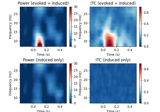mne.minimum_norm.source_induced_power¶
- mne.minimum_norm.source_induced_power(epochs, inverse_operator, freqs, label=None, lambda2=0.1111111111111111, method='dSPM', nave=1, n_cycles=5, decim=1, use_fft=False, pick_ori=None, baseline=None, baseline_mode='logratio', pca=True, n_jobs=1, zero_mean=False, prepared=False, method_params=None, use_cps=True, verbose=None)[source]¶
Compute induced power and phase lock.
Computation can optionally be restricted in a label.
- Parameters
- epochsinstance of
Epochs The epochs.
- inverse_operatorinstance of
InverseOperator The inverse operator.
- freqs
array Array of frequencies of interest.
- label
Label Restricts the source estimates to a given label.
- lambda2
float The regularization parameter of the minimum norm.
- method“MNE” | “dSPM” | “sLORETA” | “eLORETA”
Use minimum norm, dSPM (default), sLORETA, or eLORETA.
- nave
int The number of averages used to scale the noise covariance matrix.
- n_cycles
float|arrayoffloat Number of cycles. Fixed number or one per frequency.
- decim
int Temporal decimation factor.
- use_fftbool
Do convolutions in time or frequency domain with FFT.
- pick_ori
None| “normal” If “normal”, rather than pooling the orientations by taking the norm, only the radial component is kept. This is only implemented when working with loose orientations.
- baseline
None(default) ortupleof length 2 The time interval to apply baseline correction. If None do not apply it. If baseline is (a, b) the interval is between “a (s)” and “b (s)”. If a is None the beginning of the data is used and if b is None then b is set to the end of the interval. If baseline is equal to (None, None) all the time interval is used.
- baseline_mode‘mean’ | ‘ratio’ | ‘logratio’ | ‘percent’ | ‘zscore’ | ‘zlogratio’
Perform baseline correction by
subtracting the mean of baseline values (‘mean’)
dividing by the mean of baseline values (‘ratio’)
dividing by the mean of baseline values and taking the log (‘logratio’)
subtracting the mean of baseline values followed by dividing by the mean of baseline values (‘percent’)
subtracting the mean of baseline values and dividing by the standard deviation of baseline values (‘zscore’)
dividing by the mean of baseline values, taking the log, and dividing by the standard deviation of log baseline values (‘zlogratio’)
- pcabool
If True, the true dimension of data is estimated before running the time-frequency transforms. It reduces the computation times e.g. with a dataset that was maxfiltered (true dim is 64).
- n_jobs
int The number of jobs to run in parallel (default
1). If-1, it is set to the number of CPU cores. Requires thejoblibpackage.- zero_meanbool
Make sure the wavelets are zero mean.
- preparedbool
If True, do not call
prepare_inverse_operator().- method_params
dict|None Additional options for eLORETA. See Notes of
apply_inverse().- use_cpsbool
Whether to use cortical patch statistics to define normal orientations for surfaces (default True).
Only used when the inverse is free orientation (
loose=1.), not in surface orientation, andpick_ori='normal'.New in version 0.20.
- verbosebool |
str|int|None Control verbosity of the logging output. If
None, use the default verbosity level. See the logging documentation andmne.verbose()for details. Should only be passed as a keyword argument.
- epochsinstance of
- Returns
- power
array The induced power.
- power
